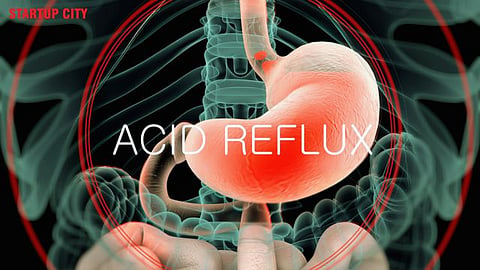

Acid reflux, also known as gastroesophageal reflux (GER) or gastroesophageal reflux disease (GERD), is a common condition that affects millions of people worldwide. It occurs when stomach acid flows back into the esophagus, causing discomfort and a burning sensation known as heartburn.
The esophagus, a tube connecting the mouth to the stomach, carries food from your mouth to your stomach.
Normally, a ring of muscle called the gastroesophageal sphincter acts as a valve, allowing food into the stomach but preventing it from flowing back up into the esophagus. However, when this valve fails to function properly, stomach acid can regurgitate into the esophagus, causing acid reflux.
The main symptom of acid reflux is heartburn, a burning sensation in the chest area. This discomfort can worsen when lying down or bending over and may persist for several hours after eating. Some individuals may also experience a bitter or sour taste in the mouth as stomach fluid reaches the back of the throat.
Several factors can contribute to the development of acid reflux. Lifestyle choices such as obesity, smoking, and low levels of physical activity increase the risk of experiencing acid reflux.
Certain foods and beverages, including caffeine, alcohol, fatty foods, and spicy foods, are known triggers for acid reflux. Additionally, medications such as antihistamines, painkillers, and antidepressants can exacerbate symptoms.
Pregnant women are particularly susceptible to acid reflux, with up to 45% experiencing heartburn during pregnancy. This is often attributed to an increase in the hormone progesterone, which relaxes the gastroesophageal sphincter, allowing stomach acid to flow back into the esophagus more easily.
Diagnosing acid reflux typically involves assessing symptoms and may require additional tests such as endoscopy, biopsy, or 24-hour pH impedance monitoring to confirm the diagnosis and rule out other conditions.
Treatment options for acid reflux vary depending on the severity of symptoms.
Over-the-counter antacids can provide temporary relief by neutralising stomach acid, but for persistent symptoms, prescription medications such as proton pump inhibitors (PPIs) or H2 blockers may be necessary to reduce acid production.
However, it's important to use these medications under the guidance of a healthcare professional, as long-term use can have side effects.
In addition to medication, lifestyle modifications can help manage acid reflux symptoms. These include maintaining a healthy weight, avoiding trigger foods, quitting smoking, and elevating the head of the bed while sleeping.
Studies have shown that adopting a healthy diet and incorporating regular exercise into one's routine can be as effective as medication in treating acid reflux.
Without proper treatment, acid reflux can lead to serious complications such as esophagitis (inflammation of the esophagus), strictures (narrowing of the esophagus), and Barrett's esophagus (changes in esophageal cells that may lead to cancer).
Acid reflux is a common condition characterised by the regurgitation of stomach acid into the esophagus, causing heartburn and discomfort. While occasional acid reflux may be manageable with lifestyle changes and over-the-counter medications, persistent symptoms may require prescription medication and medical intervention.
By understanding the causes, symptoms, and treatment options for acid reflux, individuals can take proactive steps to manage their condition and improve their quality of life.